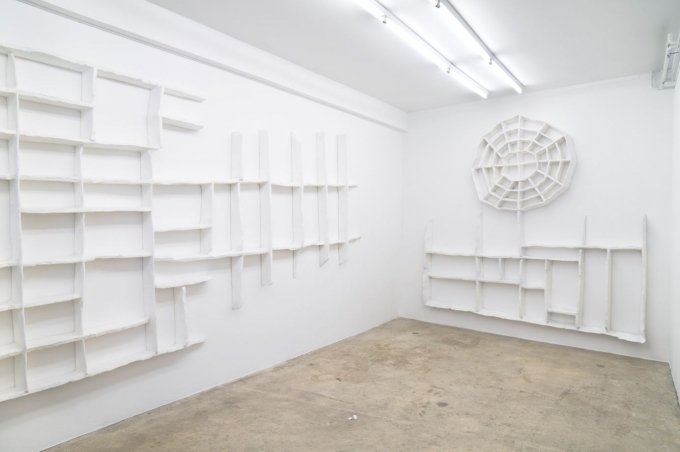»Winds of Change«. Milieu

Winds of Change
Milieu, Münstergasse 6, PO Box 536, 3000 Bern 8
Beteiligte Künstler_innen: Jacqueline Badran, Milena Langer, Matheline Marmy, Vinzenz Meyner, Niko Paech, Yamu Wang, Erik Olin Wright
Titel: Winds of Change
Datum: 9. Mai 2020 bis 13. Juni 2020
Fotografie und Credits: Milieu and the artists/ Claude Barrault
As part of the current exhibition Winds of Change Yamu Wang holds email conversations with guests on the subject of neoliberal conditions in our daily life. The exchange with Barbara Preisig deals with questions about care work. Barbara Preisig in conversation with Yamu Wang
Yamu Wang: Could you share your daily routine before and since the school closure due to the COVID-19 pandemic?
Babara Presig: Before the school closure:I was working four days a week as an employee of the Zurich University of the Arts on my independent publishing and research projects. One day a week I spent with my children at home. My children usually went to daycare and school three days a week. Most evenings were spent at home doing office work, housework and childcare.Since the school closure:I get up around 7 am, make breakfast for the children, tidy up, teach my six-year-old son (2.5 hours daily of reading, arithmetic and writing are compulsory) — well packed into playful units, of course, since a first grader cannot yet have a home office — and watch over my three-year-old son, all while cooking lunch. After eating lunch I tidy everything up again, then prepare for the next morning’s schooling while my partner takes over the kids.Ignoring the indescribable chaos that exploded in our apartment during the morning, I start my home office day. The locked room does not help against the noise of the children. I realize how incredibly exhausted I am — I am still halfway sick (with coronavirus?) and then I see the text message from my neighbor, who lives alone and is currently in self-isolation. She asks me if I could do the shopping for her. Which I then do. That‘s good, because our fridge is already empty again. Home office yield of the day: two hours.
YW: Has your experience of working from home and at the same time parenting two young children changed your conception of what the boundaries between working time and family time might be when the kids are able to return to school?
BP: I am really longing for school to reopen. But I am also noticing that care and office work have, since the shutdown, somehow became more united. I am doing these diverse kinds of work more as one person now. Things are less separated from another, which I like.
YW: That exhaustion you felt when you were finally alone for office work is totally understandable. As you describe it, the care work you perform before doing office work (which, at the moment, must be done at home) includes cooking, cleaning, pedagogy and, perhaps most fundamentally but less noticeably, the emotional labor involved in maintaining a household as well as being a parent. I find it interesting how you said that these two types of work somehow became more united and that you do them more as one person. Despite their close proximity to one another in time and space, your office work and care work are still of quite a different economic nature and require two different sets of professional skills. Could you elaborate a bit more on the 'integrity‘ that you experience?
BP: The coronavirus crisis is the first time that care work has been classified as systemically relevant. I have always tried to ensure that my job and my care work do not interfere with one another (no one should notice how much my performance at one is affected by the other). Since the school closures I am now suddenly obliged to look after my children during paid working hours! Care work suddenly becomes systemically relevant and perhaps COVID-19 holds a moment of reconciliation between wage and care work. I find it problematic that parents are doing more and more salaried work, while the children, housework and care work are increasingly outsourced to women with a lower level of education and often with a migration background. Inequality of opportunity is being redistributed among women, care for one another is being outsourced and thus subjected to capitalist dynamics. On the other hand, I am only now realizing how much I associate the feeling of autonomy with the possibility of having my own professional life as a mother, and I look forward to regaining this autonomy.
YW: It was not stated but rather implied that you and your partner seemed to share an arguably equal timetable as well as workload in running a home. (For example, before the lockdown, your partner probably also had four workdays per week like you, so that the boys could go to school and daycare three days per week. And since the lockdown, he probably takes care of the boys in the afternoon besides making dinner.) If equality was intended, does gender still play a role in the way you engage with your care work and in your domestic domain in general? If so, to what extent?
BP: Fortunately, my partner and I share all of the care work equally. Even the coronavirus-related lockdown has not changed this. Our experience is that sharing care work does indeed cause one to question gender-typical forms of behavior, which can be partially overcome. What is more deeply seated in terms of gender are socialized behaviors that are trickier to negotiate, such as how emotionally involved or dissociated to become, or what expectations are placed on the emotional and communicative exchange in a relationship.
YW: The likelihood of sharing equally in housework is very much preconditioned by factors outside the domestic domain. Take myself, for example: at the moment I’m not in a socioeconomic situation which would allow me to have a child. If I become pregnant, the support I can expect from either the father of this child or the state, or both together, would determine the terms under which I can be a mother. Very likely the father would have to be the main breadwinner and my pursuit of a career would be compromised. I may make a series of decisions that are logical and practical in terms of running a household, but end up reaffirming the status quo of gender inequality, such as women earning less than men, spending more time in unpaid care work, etc. Is there a way out (besides being a childless, single woman)? Would it be possible to think of being a mother and/or someone’s partner as a feminist project in and of itself, which contributes to emancipation from the gendered roles and expectations that exist for both men and women?
BP: I, too, believe that the shaping of the family, like many other areas of life, is largely determined by economic factors. And I also think that the independence of many women is in point of fact threatened by motherhood. The only feminist perspective I can think of is to choose a feminist partner and a relationship in which both never tire of questioning gender roles.



